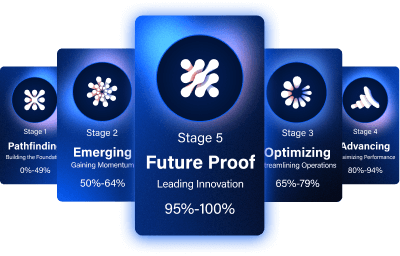Ignorance is not bliss when it comes to technology. In fact, it’s dangerous.
If accounting firm leaders and employees don’t keep up with technology trends, they risk falling behind the rest of the profession—missing out on opportunities and opening themselves up to cyberattacks. Fortunately, technology education doesn’t have to be laborious or time-consuming.
You don’t need to become an IT expert or earn a certificate in computer science. But you do need to know your technology options as a firm, and why some might be better than others.
A recent Rightworks survey on accounting technology revealed that firms face two big learning-related challenges in moving to the cloud:
- Lack of technical expertise and resources (44% of respondents).
- Lack of understanding choices (29%).
Even the 28% who cited internal resistance to new technology could probably resolve some issues with user education.
Educating workers isn’t just about moving to the cloud. It’s about knowing which technology choices are right for your firm and making sure users know how to keep your clients’ data safe. Easy learning options abound.
Why technology education is important in accounting firms
If you don’t know what you’re missing, you might be missing out on something valuable. The Rightworks survey revealed that:
- Firms fully committed to technology earn 39% more revenue per employee than those that are less committed.
- 76% of survey respondents said the value of the cloud was either high or very high.
If your firm hasn’t moved to the cloud or isn’t fully committed to it because you don’t know enough about it, you’re missing out on opportunities. What kinds of opportunities? Well, you could be managing remote work, ensuring cybersecurity and improving client collaboration—which survey respondents identified as the weakest area of their technology environment. It’s not hard to get to know the benefits of working with a cloud partner.
Another pressing issue regarding technology education is teaching about cybersecurity. A widely respected security report from Verizon found nearly three-quarters of cyberattacks involve “the human element,” generally an employee clicking on a malicious link in an email. A Comcast report concluded that phishing emails accounted for almost 90% of tactics used to attack networks.
Technology education options for accounting firms are not hard to find
Your firm needs to know how to maximize opportunities and protect data. Again, that doesn’t require a lot of education—just enough so you can make good decisions and teach employees to keep your firm safe. There are options for technology education depending on the goal you’re trying to accomplish.
Endorsements and success stories
Any time you make a major technology decision, you need to understand how it will affect your firm. One way to do that is to discover what other firms and trusted sources have experienced with that technology.
Plenty of success stories about cloud-enabled firms exist, including those that have boosted security after a near-disaster and those that have moved to the cloud to facilitate working from anywhere. There are deeper dives into how the cloud enables firms to transform their operations and boost efficiency. And if you want less biased sources endorsing the cloud, look to simple explanations of the advantages of the cloud for accounting firms offered by universities.
Deeper education
This is an option for those who have the time and interest to go deeper into understanding a technology before you adopt it. Classes—some free, some not—generally abound from multiple sources about different technologies. If you want to go beyond the surface of how the cloud works, there are courses that will go beyond giving you a basic overview and help you understand the technical details of cloud platforms. Most firm leaders and employees won’t need this level of detail, but it’s an option for the curious.
Security training
Here is where your firm can address cybersecurity preparedness. Your employees are your last and best line of defense against cyberattacks. The more they know about how to spot phishing emails and other threats, the less likely they’ll be to fall for them. Security training doesn’t have to be arduous or time-consuming. An hour or so a month could be enough. Simulated phishing attacks can also help employees spot threats in a real-world scenario. A cloud partner can help here—Rightworks offers security awareness training as part of its Total Security managed service.
Keep asking questions
If you choose to engage with a cloud partner, make sure you know the right questions to ask in the search process. It’s also wise to stay up to date with basic technology education and cybersecurity trends. A cybersecurity partner should be able to answer all of your questions and point you to opportunities your firm might otherwise miss.
Check out all the results of the Rightworks survey on accounting technology.


